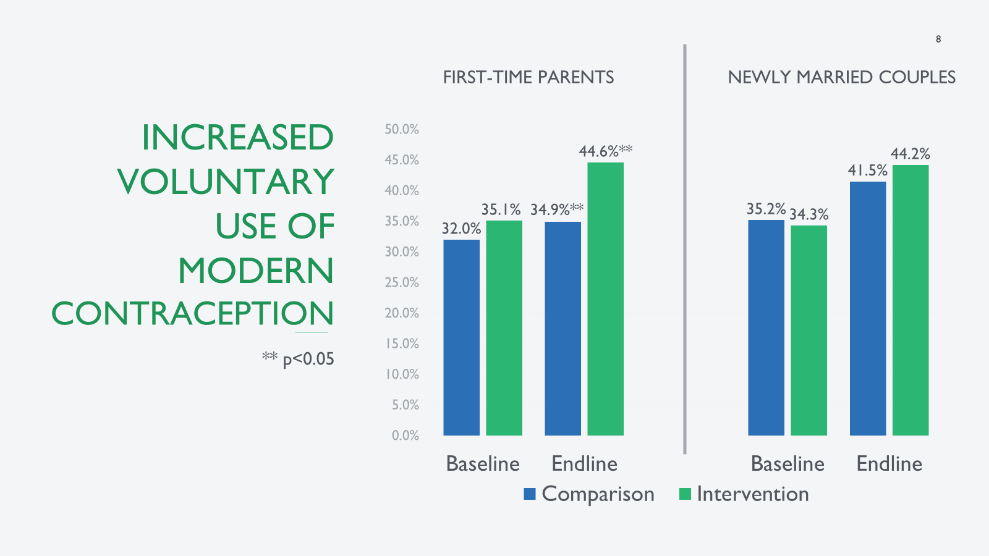Improving Voluntary Use Of Modern Family Planning Through Shifting Norms With Young Couples

This blog is cross-posted from Knowledge SUCCESS, where it was published on December 29, 2021.
In Kinshasa, Democratic Republic of Congo, more than a quarter of women have unmet need for voluntary family planning, affecting both their educational and economic opportunities—and their health. The Masculinité, Famille, et Foi project has sought to shift social norms to support the use of voluntary family planning among young couples in the city.
Social norms are unwritten “rules” governing behavior that are shared by members of a group or society. They are the informal, and often unspoken, rules by which most people live. Unlike attitudes or beliefs, which are individual, social norms reflect shared beliefs about a behavior.
Social norms matter. They not only uphold behaviors, but also reinforce social inequalities. They are specific to a setting and context and are often enforced by people who benefit from them in some way.
Studies have shown promise for shifting norms by working with people during transitional moments in their lives, such as during early adolescence, when newly married, or when they become parents. Through the USAID-funded Passages project, the Masculinité, Famille, et Foi project in Kinshasa, Democratic Republic of Congo (DRC) worked with faith communities to enable a social environment for voluntary family planning use by young couples at these important transition points in their lives. Masculinité, Famille, et Foi was a gender-transformative program adapted from the pilot program “Transforming Masculinities,” led by Tearfund and Georgetown University’s Institute for Reproductive Health (IRH) and implemented by the Église de Christ au Congo
Shifting Norms around Voluntary Family Planning with Young Couples
At the outset of this project, in 2016, we sought to identify the people whom young couples considered most influential for them in terms of reproductive health and intimate partner violence. Our researchers did this by conducting a formative assessment using the Social Norms Exploration Tool. This assessment identified faith leaders and members of faith communities as being very influential in shaping young couples’ social norms and behaviors. Knowing these key groups helped us to design Masculinité, Famille, et Foi’s programming to shift social norms.
With regard to voluntary family planning—our focus here—a key social norm identified in the formative assessment was that couples felt that their communities were not accepting of women’s use of voluntary family planning unless they already had many children. Other norms concerned how decisions were made related to the use of voluntary family planning; we found that men, who were considered the heads of households, had the final say. These social norms were important drivers of behaviors, and they had a strong effect on women’s lives.
Masculinité, Famille, et Foi worked with young couples ages 18–35 to identify, create, and embrace new, more egalitarian gender norms. Our hope was that this would increase shared decision-making regarding voluntary family planning within these young couples, increase their voluntary use of modern family planning methods, and reduce intimate partner violence (not described here).
The Transformation Process
Our program looked at the desired shift in social norms from many angles within the context of faith communities. From January 2017 to December 2018, newly married couples and first-time parents in Kinshasa participated in the 18-month program. As part of program activities, the young couples engaged in trainings, community dialogues, health talks, and diffusion activities such as community celebrations and sharing stories of change. On the agenda were discussions to help participants reflect on the importance of voluntary family planning, as well as the role of men in household and health activities intended to benefit the family. Pre-trained, well-respected “gender champions” and faith leaders from within the congregations mentored couples throughout the program period. Links were also made to local health care centers through health talks led by community health workers and the distribution of referral cards. Another nine congregations were selected as a comparison group and received only the health service referrals, without the activities to shift norms.
he Effects of the Program on Voluntary Family Planning Behaviors and Norms
To learn whether the program had achieved the desired effects, researchers conducted two sets of surveys with program participants. Before the program began, the newly married couples and first-time parents in both participating and nonparticipating congregations responded to a survey (the “baseline” survey). After the intervention, they answered a second survey (the “endline” survey, the results of which may be found here). The surveys provided first-hand data on the situation of social norms for family planning, and specifically for young couples, in this context.
Modern Voluntary Family Planning Use Increased
The results of the program showed more significant improvements in voluntary family planning use among the young couples in the group who participated in the program, compared to those who had not participated. Figure 1 shows endline results on voluntary use of modern family planning methods by first-time parents and newly married couples.

In fact, more than half of all women participants who were not pregnant during the second survey (53%) said they were using a modern method of voluntary family planning within their relationship, up from 40% before the program began. These shifts in behavior were supported by shifts in young couples’ attitudes and confidence in their ability to use modern voluntary family planning.
Further, both young couples and the key groups around them influencing social norms saw modern voluntary family planning use as more typical and appropriate for young couples after the program compared to before the program. For example, among first-time parents in the intervention group, 91% felt that their partner would approve of them using a modern voluntary family planning method, as compared to 80% of those in the comparison group. In addition, at the final survey, more participants considered their partner or a health worker to be important influencers, and fewer mentioned other nuclear family members as influencers. This is key, because it means that this couples-based program with strong links to health care has the potential to shift sources of social support for behaviors related to voluntary family planning.
Through its guided examination of social norms, creation of a supportive environment, and links to health care, Masculinité, Famille, et Foi has shown that faith-based programming holds promise for shifting social norms to improve voluntary family planning use, along with other supportive behavioral shifts. The program—the first of its kind to work directly with faith leaders and within faith communities to confront and address social norms—demonstrates the importance of these influential leaders and communities on the lives and behaviors of individuals.
As one religious leader described, “The Bible is not against [voluntary] family planning, because when the Bible says, ‘Multiply, be fruitful, and fill the earth,’ people must be well educated and well trained, otherwise they may create problems. Every couple must first assess their means to finally determine the number of children they must have to assume their responsibilities. Therefore, the Bible also teaches [voluntary] family planning.”
This program raises several thought-provoking questions about how social norms shift, the relationship between behavior change and norms shifting, and the role of people with an influence on program participants in these shifts. Further analysis is currently underway to better understand these remaining questions. Stay tuned!
Header image: Health care center nurses in Bumbu commune in Kinshasa, DRC. Photo credit Didier Malonga.
 Where We Work
Where We Work  Press Room
Press Room  FACT Project
FACT Project  Passages Project
Passages Project  Learning Collaborative
Learning Collaborative  Search All Resources
Search All Resources  Social Norms
Social Norms  Fertility Awareness Methods
Fertility Awareness Methods